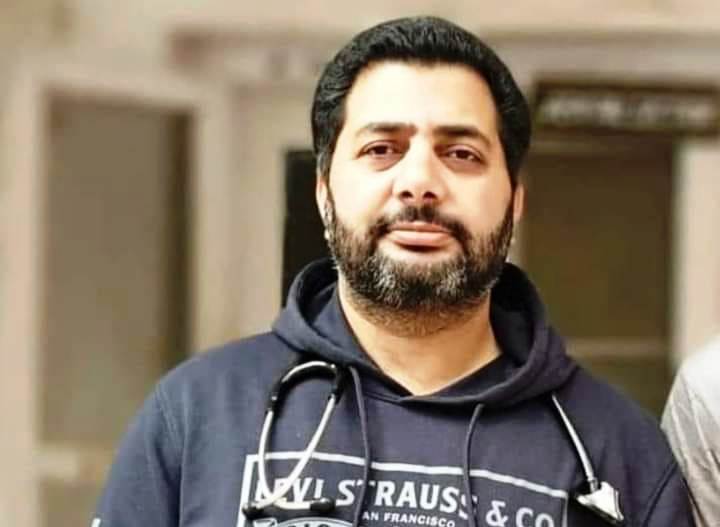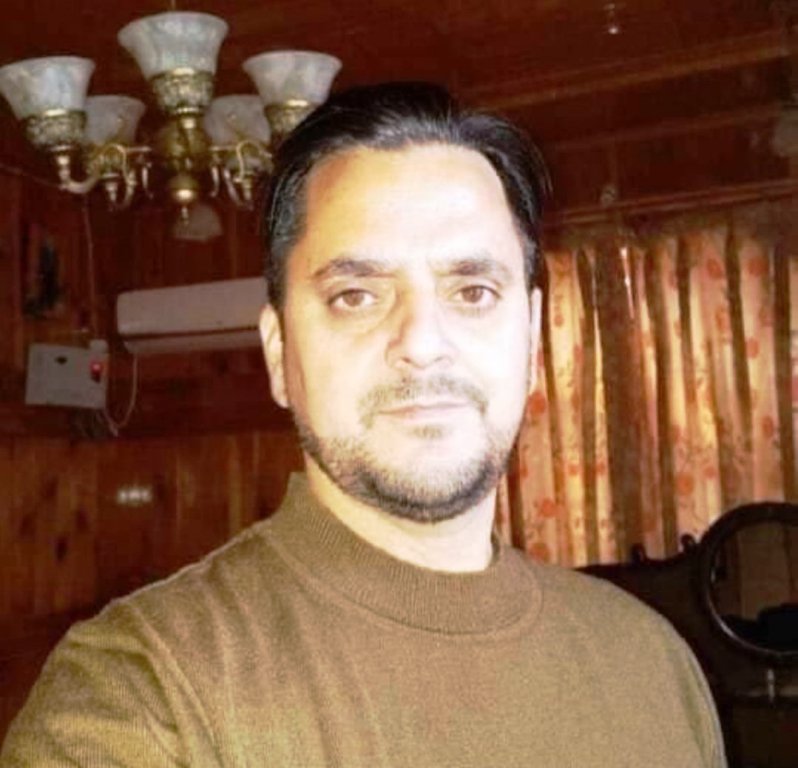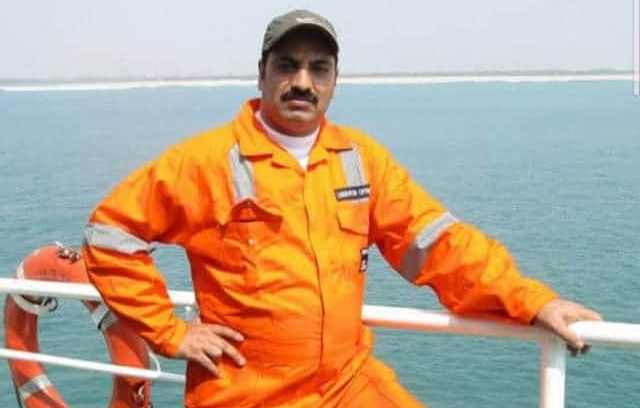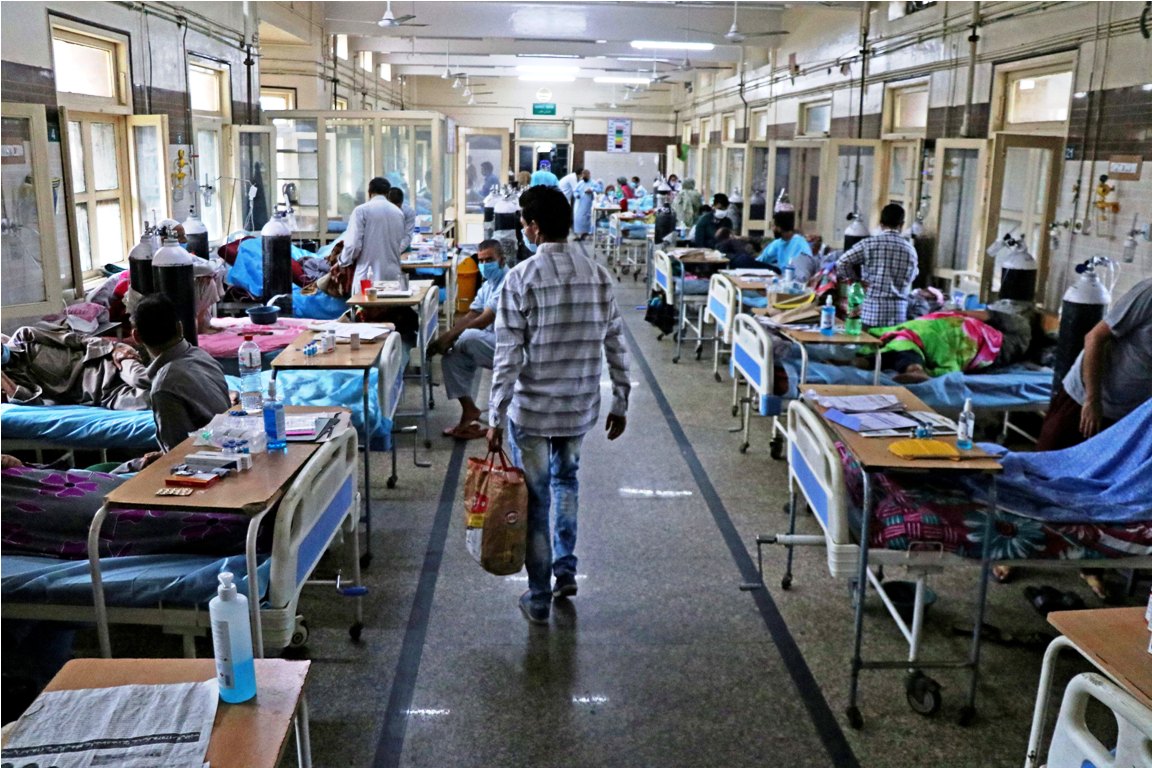Around 1100 health workers in Kashmir contracted the infection, fought it and recovered, unlike the five doctors who died. Preoccupied with managing Covid-19 and the crisis the lockdown created by delaying interventions, these frontline warriors are still too busy to tell their stories of pain, loss and hope. Farzana Nisar brings out some emotional stories from the warrior side

It was July 2, 2020, and as the light of dawn seeped into his room, Dr Mir Mushtaq rubbed his bleary eyes and got up. He felt a slight body ache and mild fever, which he initially thought of as a normal illness. But when the symptoms continued to worsen even after taking the requisite medication, Dr Mir rushed for a chest X-ray, and the findings revealed some complications. He then immediately got his RT-PCR, a real-time test done and expectedly tested positive for Covid-19, a viral infection that has killed almost 1.5 million people across the world.
Nuclear Families
“I had been working for months in district hospital Pulwama, which was designated as a Covid-19 hospital and was in regular contact with the patients,” Dr Mir, who is posted as Deputy Medical superintendent at DH Pulwama, said. “So, I always was apprehensive of contracting the virus,” said Dr. Initially, Dr Mir was admitted in the same hospital but was later shifted to SKIMS where he was admitted for 14 days.
“My wife, who also happens to be a doctor, my two daughters and our maid tested positive for the virus because of me but fortunately they were asymptomatic,” he said.
Dr Mir recalls the experience as a terrible one and believes that the toughest part about being a doctor during Covid-19 was to remain away from families. “We had to choose between patients and family because we at the frontline were at a maximum risk and could easily transmit it to the family. They were always in the back of our minds,” said Dr Mir who is also the spokesman of Doctors Association Kashmir (DAK). “And when you are a nuclear family, the challenge doubles. There is nobody to take care of your kids and you have to visit them”.
According to the doctor, handling fearful and agitated patients and their attendees was yet another challenge for them during the viral outbreak.
“I remember a pregnant lady who tested positive was not ready to get admitted and wanted to run away from the hospital,” Dr Mir while sharing an instance said.“It took us nearly half a day to counsel and make her understand the seriousness of her case.”
However, Dr Mir also holds the opinion that the panic among the public was justified. “The situation, in the beginning, was hysteric and we all were facing it for the first time. So people reacted too emotionally in certain cases. But as doctors, we had to try to understand their psyche and keep our cool.”
It took Dr Mir nearly a month to recover fully and get back to work but the death of his colleague, Dr M Ashraf Mir, a resident of Pampore area of south Kashmir’s Pulwama, came as a shock to him. Posted in the same hospital, the two doctors were more of friends than just fellow workers.

A Fighter Falls
Dr Ashraf treated Covid-19 patients for over four months before he himself fell prey to the invisible virus. One fine day in July donned in his protective gown and gloves, Dr Ashraf was busy in serving his patients. Towards the afternoon he felt that his body temperature has slightly risen. Subsequently, he developed severe fatigue along with other Covid-19 symptoms. Quickly, he was rushed to SKIMS, Soura on July 25.
With each passing day, his condition worsened and a number of posts requesting recovered Covid19 patients to donate plasma for the young doctor went viral on social media. The plasma was arranged and Dr Ashraf tested negative.
But fate had other plans. The doctor experienced shortness of breath and was immediately shifted to the Intensive Care Unit. Despite being on the ventilator he developed lung fibrosis and passed away on August 9, 2020.
Dr Mir remembers his friend as a favourite of his patients. “It was because of his hard work and dedication that patients used to line-up outside his chamber for check-ups. From day one he served Covid-19 patients in the isolation ward,” Dr Mir said. “He fought like a warrior and this is an irreparable loss for us.”
As shared by Dr Mir on Twitter, the last words written by Dr Ashraf minutes before intubation at SKIMS were kullu nafsin zaiqatul maut (Every soul shall taste death).
Family In Mess
Back at home, in Pampore, Dr Ashraf’s family is yet to come to terms with his death. Dr Ashraf’s father died of a cardiac arrest a few months before the pandemic hit the world and is now survived by his wife, two children and his mother. His wife, Firdousa Ali is a government school teacher. His daughter, Aayat Ashraf recently appeared in NEET examination and his son, Abu Bakr is an eleventh class student.

Aayat Ashraf, 20, who also was a Covid-19 patient, has confined herself to the four walls of her room, after the death of her father. Earlier a fun-loving and talkative girl, Aayat hardly talks to anyone now.
“My Baba was everything to me. I could have never imagined living without my father. We shared a very strong bond; he was more of a friend to me. He has left a void in our lives,” Aayat said. Aayat called his father a family man and said, “No matter how busy his schedule would be, he always managed to spend time with us.”
After having lost her husband and son in just one year, Dr Ashraf’s mother is showing major behavioural changes. “First she lost her spouse and then her only son, so her grief is unimaginable. She gets angry at minute issues and sometimes even says out of context things,” Aayat said.
People remember Dr Ashraf as a pious human who devoted his life in serving his patients. At his home, he had set-up a clinic where he used to give free consultations to patients.
“Whenever we expressed fear of him leaving the house during Covid-19, Baba often used to say, God has chosen him for this noble profession and He is the one who will protect him,” Aayat said. Both his children want to continue their father’s legacy and become doctors.
It is pertinent to mention that the Doctors Association of Kashmir (DAK) had earlier appealed to government to sponsor Dr Ashraf’s child for MBBS. However, according to the family, no such thing was offered to them.
Contagion In Paramedics
Unlike these doctors, Altaf Wani, who is a laboratory professional at SKIMS, Soura Srinagar was not in direct contact with the patients but his regular visits to the hospital made him and his wife a Covid-19 victim. Recounting the traumatic experience of how he became a coronavirus patient and eventually requiring intensive care and mechanical ventilation before recovery, Altaf said: “Even though you are a medical professional, the fear of the new and unpredictable disease grips you. I took every possible precaution to protect myself but since my workplace was a designated Covid-19 hospital, I was always anxious about contracting the virus.”
Altaf was in the middle of a busy weekend when he began to experience extreme fatigue and nausea. He self-isolated, but vomiting with fever, muscle pain and breathlessness developed over the subsequent week. Realizing he was becoming seriously ill, he went for a CT scan and a Covid-19 test. The scans revealed suspicion of the contagion and later on, the test came positive, after which he was admitted in the infectious diseases block of SKIMS. His wife also tested positive for the virus and complained of mild symptoms. However, within the next 12 hours, Altaf’s condition worsened. He developed haemoptysis and was diagnosed with acute pneumonia.
“I was put on oxygen in the intensive care unit and the last memory I have before losing consciousness is of talking to my mother on phone. I tried my best to keep her in good spirits and pretend that I was alright, but as a mother, she sensed my uneasiness,” Altaf said. “The worst part of this virus is that it is very isolating. Your parents, family and loved ones cannot be with you. It makes you feel alone.”
While being on the ventilator, Altaf shares that the feelings were very overwhelming. “I have hazy memories of mechanical ventilation but it was a fight between life and death. I was in agony and felt like this is the end. I prayed and kept thinking about my family and loved ones.” He began a phased return to work on October 10, nearly a month after his last shift.
Loss And Stigma
Doctors everywhere followed the set protocol and tried their level best to stay away from the invisible enemy. But the virus made its way. On a cloudy evening of November Dr Rakshanda Manzoor, Medical officer at Government Gousia Hospital, Khanyar is driving home from work. Lost in thoughts of grief caused to her by the pandemic, Rakshanda tries hard not to let her mind wander.
During the first phase of the pandemic, she was posted at the control room at DC office Srinagar and after some months when she joined back her work at Gousia Hospital, she was always scared of contracting the virus and later spreading it to her family.
“At the end of the day, the thoughts used to linger, what if I have acquired the infection today and I go back home and infect my family? A carefree hug to my daughter was what I longed for,” Dr Rakshanda said.
Sadly, all her apprehensions came true. On August 12, after returning from work, her body ached but she took it for normal exhaustion. During the night, she felt feverish and short of breath. The following day, she got herself tested for the virus and the report came positive, and afterwards, her whole family also tested positive.
“My mother, my father, my brother’s family and my little daughter were all positive. It was a very tough time and my whole world turned upside down,” she said.
Her mother who developed bilateral pneumonia was admitted at CD Hospital and her father, a DCM (Dilated Cardio-myopathy) patient was admitted at SKIMS. Being a single parent, Dr Rakshanda decided to quarantine herself at home.
“My daughter is just 10 years old and I had no other option than to self-quarantine. There was no one else who could take care of her,” she said. A CT scan report diagnosed her of mild pneumonia, so she maintained her oxygen saturation levels at home with the help of an oxygen concentrator.
On August 26, Dr Rakshanda’s father passed away at SKIMS, Soura. “My mother didn’t know about the death for days, as she herself was admitted in another hospital. Our lives have changed drastically after the death of my father. I don’t have words to describe my loss,” she said, with a sigh. “My mother is presently on anti-depressants”.
Deeply concerned by the stigma of Covid-19 associated with healthcare professionals, Dr Rakshanda feels that the social ostracism has affected her mentally. “The damage caused by the virus in our lives is irreparable but this society is adding to my trauma by holding me responsible for bringing the virus home when in reality I was just performing my professional duties,” she said. “I have time and again heard my relatives saying, Yi asyath na tchey haspatal onmut (The virus would have been carried by you from the hospital)”.
In The Main Hospital
Concurring, Dr Khursheed Ahmad Dar, a pulmonologist at Chest and Disease Hospital, Srinagar expressed that a lot of medicos have had problems with their mental health during this period.
“The situation in hospitals was extremely anxiety-provoking not just for patients but for health professionals too. A number of my colleagues and resident doctors had emotional bursts owing to the hectic and monotonous schedule that most of them had to follow,” Dr Khursheed said.
When Dr Naveed Nazir, another leading pulmonologist at Chest and Diseases Hospital tested Covid-19 positive, Dr Khursheed had to take the charge of the situation. As the hospital was getting an increasing number of corona cases every day, Dr Khursheed decided not to get himself tested for the virus.
“I didn’t get myself tested, I feared that if I also had the infection who would take the responsibility,” Khursheed said. He didn’t visit his home for nearly 17 days and said that the thought of his elderly parents was always at the back of his mind.
Explaining the struggle of attending to the patients in protective gears, Dr Khursheed said that sporting PPE kits for long hours was in itself a big challenge for the doctors, as they couldn’t even go to washrooms or drink water.
“Drenched in sweat in the hot summer and not able to take a sip of water was a difficult part of our routine,” Dr Khursheed said. “We also witnessed many health care professionals complaining about dizziness and kidney-related issues because of the dehydration.” He said the resident doctors and registrars are the real front-line warriors, who worked tirelessly during the pandemic.

A Resident Show
One such resident doctor, Dr Altaf, a surgeon at SKIMS, Soura worked in the Covid ward of the hospital for two months. On July 7, Dr Altaf had to perform five emergency surgeries, out of which 2 patients turned out to be positive later on.
“It wasn’t possible to test the patients for the virus before operating on them as they were all emergency cases like appendicitis, accidents,” Dr Altaf said. On July 10, after experiencing mild symptoms he tested Covid-19 positive. However, the doctor said that the journey thereafter was bitter for him.
“Many of the resident doctors after testing positive were neither allowed to reside in the hostel nor admitted in the hospital. It was as if we were disowned by the hospital authorities. I was asked to return to my home but how could I? Going home meant infecting my aged parents,” Altaf said. “I then rented a hotel room out of my own expenses in Srinagar and quarantined myself there.”
After recovering, Dr Altaf went back to serve Covid-19 patients.. “My family came to know about me being positive nearly a month later and they reacted very emotionally to this news,” he said.
Kashmir also witnessed some cases of violence against health care professionals. However, the paramedics feel that those incidents didn’t stop them from performing their duties. “The pandemic was a health emergency and ethically we couldn’t run away from our duty. It was our responsibility to come forward and give our best,” Dr Altaf said.
Infections And Surgery
Having operated on his patients after they recover from Covid-19, Dr Abdul Rashid, a top paediatric surgeon at Super Specialty Hospital, SMHS Srinagar, also has a story of hope and survival. Recalling how the Coronavirus symptoms gave him sleepless nights initially, Dr Rashid believes that anxiety is the most common reaction to the virus. “Although I am a doctor, I was scared to even at the thought of it. The news of death due to the contagion all over the media was too depressing,” he said.
After the lockdown was announced, Dr Rashid had to visit his workplace only for emergency surgeries but the changed schedule did not prevent him from contracting the virus. “I never worked in a Covid-19 ward and had to visit my hospital only twice or thrice a week but somehow me and eventually my wife and daughter contracted it, and I always used to think that will we recover or will it be fatal for us?” Dr Rashid said. “My biggest challenge was to keep my aged mother safe and when there was nobody to take care of her, we left for our village in Kulgam.”

It took Rashid three weeks to recover and return to his duties. After joining back, he got his antibodies test done and the report was positive.
Many pieces of research also have consistently shown that the healthcare professions experience higher levels of work stress than the general population, even under normal circumstances. The Covid-19 crisis places additional pressure on doctors and on the healthcare system in general and research shows that such pressure brings a greater risk of psychological distress.
Out of many Covid–19 deaths that Kashmir reported, one was of Dr Shabir Ahmad Malik. Posted as Medical Officer under National Health Mission (NHM), the doctor was fighting pandemic in the remote Gurez valley of Bandipora district.
Hailing from North Kashmir’s Sumbal area of Bandipora, Dr Shabir was actively involved in contract tracing in the picturesque village. On July 4, he was tested positive for the virus and later after developing some mild symptoms was admitted at a local hospital on July 8. He soon recovered from the infection and was tested negative on July 15, following which he was discharged from the hospital. However, twelve days after recovering from the disease, Malik developed severe cough with fall in the oxygen saturation level at home and was soon shifted to SMHS hospital where he breathed his last. The doctor is survived by his wife and two minor children. His wife, Dr Shaista, is also a medical officer under NHM.
Post Script:
More than 1100 health workers have contracted the infection and recovered. Doctors make a good percentage of the Covid-19 infected and recovered lot.















